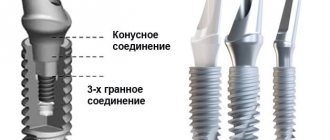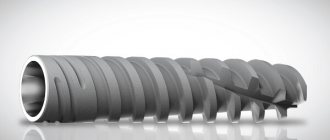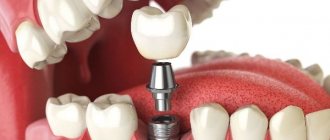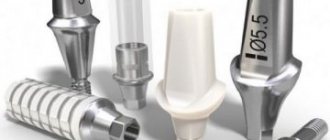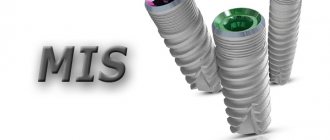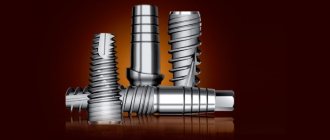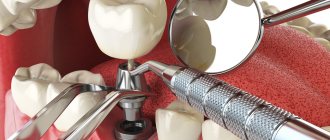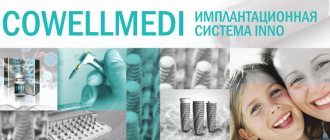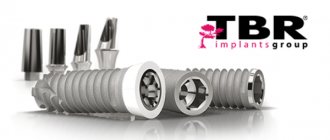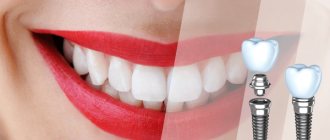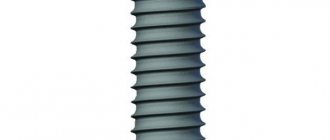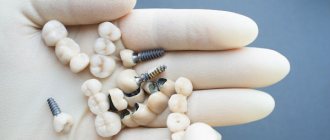Manufacturer of implantation systems Bicon
An innovative model of a dental implant.
A special place among implant manufacturers is occupied by the American company Bicon Dental Implants, which began operations in 1968. The first rods were made of aluminum oxide, later titanium was used.
Baikon made a breakthrough in the field of implantology in 1985, developing an innovative model of an artificial tooth root with a length of only 8 mm (at that time, models shorter than 12 mm were not produced). In creating implant systems, Bicon Dental Implants used information obtained from dental developments by the United States Army that began in 1968. The combination of data from medical institutes, leading dentistry and research centers made it possible to create shortened rods with wide threads.
Further research led to the development of an innovative coating that accelerates and improves the quality of osseointegration. Along with production, the company devotes a lot of time to educational activities and conducts training courses for dentists all over the world.
Design features
Bicon implants are the brainchild of the American company Bicon Dental Implants, which has been a leader in the dental materials market since 1985 and conducts constant research in the field of prosthetics.
The Bicon implant system allows you to solve a whole range of problems in the field of dental implantology. The product is a special model of an implant, the length of which is about 8 mm, while other manufacturers maintain product lengths from 12 to 22 mm.
A distinctive feature of the company can be considered its long experience of scientific work on the creation of shortened implants, which has attracted the attention of the entire civilized world. The products of the leading company Bicon are known in almost 70 countries around the world, which indicates the highest quality and reliability of the installation.
The company regularly conducts trainings and scientific seminars to improve the skills of prosthetic dentists in order to ensure decent quality of installation of Bicon implants.
The design features of the system include:
- Small sizes (from 8 mm). The short length reduces the risk of bone tissue destruction.
- Only 2 components with tight fastening . A minimum of parts in the installation prevents the formation of gaps between elements, where an inflammatory process can develop.
- A short recovery period . Rapid rehabilitation does not affect the appearance of teeth.
- Large implant surface area . This design feature allows for the installation to use a minimal area of bone tissue.
- No screw connection . This feature makes it possible to rotate the implant 360 degrees and install crowns both on the abutment and with cementation outside the patient’s mouth.
The company’s specialists always provide remote consultations on implantation with Bicon systems. Many patients and doctors are quite satisfied with the perfect design without unpredictable problems during installation and operation.
Read reviews about removable dentures with mini-implants, their advantages and disadvantages. Visit here to learn more about the necessary care for dental implants to prolong their lifespan.
At this address https://dr-zubov.ru/implantaciya/metodiki/bazalnaya/vse-za-i-protiv.html we offer material about basal dental implantation and its cost.
Features and technological solutions
The designs of Baikon implants have opened up new possibilities - performing the procedure in conditions of jawbone atrophy. There is no need to first perform bone grafting, displace the mandibular nerve, or increase the height of the alveolar process using the distraction method. Additional features include:
- The effectiveness of surgery for the fourth type of bone (porous with signs of osteoporosis).
- Possibility of implantation in conditions of significant interocclusal distance.
- Conical connections prevent the penetration of bacteria.
- Increased shaft area provides stability.
- The beveled shoulder of the neck makes the structure invisible in the gum.
- The special coating speeds up healing and minimizes the risk of complications.
- Possibility of instant prosthetics (due to a special abutment).
Features of construction and design
The main feature of Bicon implants is their size.
The connection features provided in the design make it possible to make all abutments with different diameters interchangeable.
This greatly simplifies the work at the prosthetics stage, and also ensures excellent aesthetics of the final result, which is, first of all, important for the patient.
Due to the special shape, the surface area of the implant is significantly increased, which makes it possible to install it with minimal amounts of bone tissue. It also speeds up the healing process, making it more comfortable.
The full catalog of manufactured systems can be found on the company's official website.
Advantages and disadvantages of Baikon dental implants
Dental restoration with Baikon systems has positive aspects:
- Easy installation;
- rapid engraftment;
- reliable fixation;
- identical to natural teeth;
- functionality;
- possibility of prosthetics immediately after implantation of the system;
- atraumatic;
- suitable for two-, one-stage, express implantation methods.
- can be placed for periodontal disease, bone atrophy;
- lack of fastenings, tight fit of the components;
- high level of safety, biocompatibility;
- the possibility of implantation without installing a crown (if there is a deficiency of interdental space, the doctor performs veneering of the upper element of the rod);
- high quality;
- long service life, lifetime warranty;
- There are different options for using Baikon structures:
- single implantation under metal-ceramic and all-ceramic crowns;
- creating a base for bridges;
- removable dentures.
The disadvantages include its lack of prevalence in dental clinics in Russia. Some experts consider the method of implantation to be a disadvantage - the artificial root is not screwed in, but “driven” into the jaw, which can cause discomfort to the patient and increase the risk of rejection of the structure.
Indications and contraindications for use
Baikon implant systems are shown:
- immediately after tooth extraction;
- if the bone is atrophied;
- requires immediate implantation and loading;
- It is necessary to carry out implantation according to the classical scheme.
There are no direct contraindications to the installation of Bicon implants. However, there are a number of restrictions:
- defects of the oral cavity - malocclusions, caries;
- the patient is mentally ill or prone to nervous breakdowns;
- at the time of implantation, the patient has a viral disease;
- poor oral care;
- chronic diseases of important systems and organs;
- allergy to anesthesia or inability to use it for medical reasons;
- intolerance to the main material, titanium (occurs no more often than in 2% of cases).
Almost all contraindications are reversible and after they are eliminated, implantation can be performed.
Installation Features
The process of introducing the Bicon implant system into the bone does not differ significantly technologically from installing other types of structures, except for one nuance.
A special feature of the installation of the structure is the absence of a screw rod, due to which the implant is not screwed into the bone, but is driven in with a special tool. Here the opinions of experts differ.
Some talk about the primary instability of the prosthesis and decreased survival rate, while others consider this process less traumatic. In addition, such forward movements of the implant into the jaw bone cause discomfort to the patient.
The video shows the process of installing BICON implants.
Types of products from the catalog
Short
When developing the Short rods, which have an internal diameter of 3 mm , the need to properly distribute the load on the teeth was taken into account. The model has a tight cone-shaped connection that prevents the penetration of pathogenic microorganisms inside. Due to the increased width of the connection plateau, the structure has increased stability. Due to the sloping shoulder of the neck, the artificial root penetrates into the bone tissue below the cortical line.
By combining the designs, the stability of the rod and the ability to activate regenerative processes in tissues are increased. Can be used to restore one or more teeth with insufficient bone volume. Systems with a three-millimeter internal connection diameter include models with an external diameter:
- 4.5 mm. The total length is 6-11 mm, the coating can be ordinary and accelerate osseointegration.
- 5 mm. They have different coatings. The total length with the osseointegration surface is 5, 6, 8, 11 mm, with the usual one - 6, 8, 11 mm.
- 6 mm. The model with titanium coating has a length of 5.7 mm, the improved one is 5.8 and 5.7 mm.
Short Bicon implants
MAX
implants with an internal diameter of 2.5 mm are specifically designed for placement in the anterior jaw arch, but can also be used in other segments of the jaw. Equipped with a reinforced cone-shaped wide neck. The inner diameter has increased retention. The unique connection allows the abutment to be removed and reinstalled.
The line includes the following models:
- 4 mm. Product length 11, 8, 5 mm. In the group of conventional implantation systems, there are no prostheses measuring 5 mm.
- 4.5 mm. Includes 4 types of rods: 2 with osseointegration coating and 2 with titanium, their length can be 11 and 8 mm.
Narrow
A series of short rods with an internal diameter of 2 mm called Narrow , indicated for installation in the frontal area of the lower jaw with limited space between the teeth. Due to the special structure of the neck, connecting to the abutment, a diameter of at least 3 mm is formed.
The American company has created several models with an internal diameter of 2.5 mm and different external diameters:
- 3 mm. There is only one model with these parameters; its length is 8 mm, and the coating accelerates healing.
- 3.5 mm. The implants of this group have two types of coating and a length of 11 or 8 mm.
- 4 mm. It has two surface options, length - 8 or 11 mm.
Abutments
In the photo: 1) Temporary abutment; 2) Shaper; 3) Abutment with shoulder; 4) Abutment without shoulder; 5) Brevis abutment; 6) Locator abutment
Bicon Dental Implants produces temporary and permanent abutments:
- shoulderless;
- shoulder;
- corner;
- straight (classic);
- universal;
- templates;
- shapers.
Installation procedure options
Baikon implants can be installed:
- According to the protocol with immediate functional load. After implantation, a temporary crown is put on, restoring the functions and aesthetics of the dentition until complete healing. During installation, bone compression is applied.
- Using a two-stage method. After implantation, the implant is covered with gums for a healing period of 2 to 6 months. 2-3 weeks before prosthetics, the rod is surgically opened and an abutment is installed. Next, prosthetics is performed.
- Using a one-stage surgical technique. After tooth extraction, an implant with a gum former is immediately implanted into the socket. The latter forms an even gingival contour around the artificial root. This eliminates repeated surgical preparation before prosthetics. In some cases, it is possible to install a temporary crown.
Implantation stages
- Preparatory – clinical examination, targeted, panoramic photographs of the jaw. Sometimes diagnostic models of the jaw system may be required to evaluate the interocclusal space. If there is a lack of bone, a computed tomography scan is required to determine the position of the maxillary sinuses and mandibular nerve.
- Implant installation is performed in the following sequence: Administration of anesthesia.
- Pilot osteotomy, bone preparation to prepare the bed for the implant.
- Implantation of the rod into the bone.
- Installation of the crown within the time limits provided for by the implantation method.
Properties of other implant systems for comparison
Nobel Biocare Implant Systems
Produced in Switzerland. Belongs to the premium segment. Nobel characteristics:
- Can be used to restore one tooth or the entire jaw.
- It has a cone-shaped shape, which significantly reduces tissue damage during implantation.
- The triangular surface of the implant allows for a more tightly secured Nobel abutment.
- The porous surface structure promotes faster and more reliable bone tissue growth around the artificial root.
- Minimal risk of counterfeiting (systems have a serial number).
- They are installed using one-stage and two-stage implantation methods.
- Lifetime warranty.
- The survival rate reaches 99%.
Osstem
Country of origin: South Korea. Properties and advantages of Osstem implants:
- They can be installed in one or two stages, and temporary structures are also available.
- The rough surface improves the healing process.
- There are models with increased stability that can be installed in heavily discharged bone.
- The surface of the rod is sandblasted with aluminum oxide.
- The outer coating of the structure combines a crater and a micro-deepening, due to which the osseointegration process is accelerated by 20%. Loading of the implant can be carried out after 6 weeks.
- The general coating of the SMR provides a complete imitation of bone.
- Can be used for low jaw bone density.
- Has a low rejection rate.
- Long service life.
Implant systems
Alpha Bio
Produced by an Israeli company for more than 20 years. These are budget implants. The Alpha Bio lineup is presented:
- Alpha Tec - has a standard layout with parallel walls, thread pitch - 0.6 mm. Can be used for bone density types 1 and 2.
- Spiral - in the form of a cone, securely fixed in the jawbone. Indicated if the bone has density types 2, 3, 4.
- Dualfit - has a conical shape, double thread with a pitch of 2x1.2 mm. Used for installation in bone tissue of any density.
- Arrow Press is a very thin implant with a cone shape. The thread pitch is 1.2 mm. Thanks to the hybrid surface, the root is securely fixed in the tooth socket. Used for implantation on a very small area of bone tissue.
Dentium
South Korean Dentium systems have been produced since 2000. Have the following features:
- The kit includes tools for implantation.
- They are made of biocompatible material that accelerates the engraftment process without causing complications.
- Long service life due to design features.
- After implantation, the load is distributed evenly.
- Possibility of installing the rod at an angle.
- Quick installation and healing due to double thread.
Price
The price of the Bicon implant is relatively high. In general, the products of this company belong to the premium class. One sample will cost the patient approximately 20-30 thousand rubles, but everything directly depends on the characteristics of the jaw and the complexity of the model made.
If we talk in general about the process of implanting just one unit, taking into account all the accompanying manipulations and other elements, as well as the instruments necessary for the operation, the cost can be about 80 thousand rubles (check with your clinic for more details.
The cost of the Baikon implant may vary. It all depends on the status of the dental clinic, fashionable designs and the number of teeth that need implantation. The average cost of the presented product is 30,000 rubles.
If, after implantation, a person experiences unpleasant symptoms or the product is rejected, then you should immediately consult a doctor. In addition, consultation with a specialist is necessary in cases where there is severe pain when pressing on the prosthesis. All the previously described positive qualities of Baikon implants make this product accessible to many clients. Thus, they are able to enjoy life and not worry about their appearance.
The total cost of restoring lost teeth using the Bicon implant system includes several components:
- Implant itself.
- The operation to install it.
- Preliminary examinations and mandatory professional oral hygiene.
- The final prosthesis and its installation.
On average, the cost of one implant is about 20 thousand rubles.
Also, the final amount that the patient will need will depend on subjective factors - the pricing policy of the clinic, its location, the level of qualifications of the medical staff, and so on.
The price of Bicon implants may vary depending on the status of the dental clinic, the implant model, and the number of teeth that need implantation.
The average price of a Bicon implant is 30,000 rubles.
